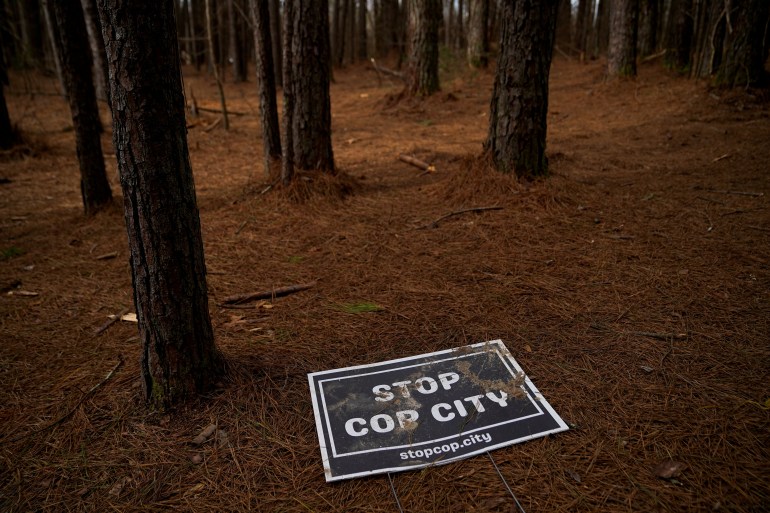Atlanta: Police shooting of activist fuels ‘Cop City’ controversy
The killing has not halted the US city’s plans to build a police training centre in the heart of majority-Black neighbourhoods.

Atlanta, Georgia, US – For the past two years, Atlanta’s “Stop Cop City” has been a largely peaceful opposition movement, with activists building treehouses to occupy a plot of forest earmarked for a police training centre.
But last month, things took a violent turn when environmental activist Manuel Esteban Paez Teran, 26, was gunned down during a police raid. According to a private autopsy conducted by his family, the young man, known by the nickname “Tortuguita” because he loved turtles, was shot at least 13 times.
Keep reading
list of 3 itemsWhat’s next in the battle over Atlanta’s ‘Cop City’?
Atlanta mothers mourn sons ‘executed’ by police
The officers involved in the confrontation were reportedly not wearing body cameras, but police have alleged that Teran shot first at a state trooper after ignoring verbal commands. Activists and Teran’s family members say otherwise.
“Manny was a kind person who helped anyone who needed it. He was a pacifist. They say he shot a police officer. I do not believe it,” the young man’s mother, Belkis Teran, said in a public statement after the January 18 killing. “I do not understand why they will not even privately explain to us what happened to our child.”
Although Atlanta police have released some body camera footage from officers who arrived at the scene after Teran was shot, none provides a glimpse into the operation itself. Teran’s family says the videos “raise more questions than they answer”, and has called on all agencies involved to release all relevant recordings. The ambiguity has led to growing calls for an independent investigation.
Experts say this is the first documented case of an environmental activist being killed by United States police. But it has not stopped Atlanta’s plans to move ahead with a massive police and firefighter training centre dubbed by activists as “Cop City”.
Opponents say the facility, being built in a forested area surrounded by majority-Black neighbourhoods, will damage the environment and contribute to the oppression of their communities. City officials have said the project will be sensitive to environmental concerns, including the protection of hundreds of acres of green space, and provide more effective training grounds for police and firefighters.
Activists who spoke with Al Jazeera late last year said they were committed to shielding the forest from a police takeover.
“The real terrorist is someone who wants to destroy a forest to build a militarised training facility,” said an activist who goes by the pseudonym “Fruit Bat” to protect their identity from authorities. “I have a taste of true freedom that I don’t find in cities and other places with concrete. It lifts me up – the people here and the interaction with nature.”
Fruit Bat has since been arrested and charged with domestic terrorism, along with more than a dozen others, according to sources in the movement. Some have been accused of vandalising police vehicles.
Chilling message
Experts say they have never seen such severe criminal charges used against protesters in the US, sending a chilling message to future dissidents.
“Laws like this quell speech, and it’s really supposed to do nothing but make sure that you do not criticise the government,” Christopher Bruce, policy and advocacy director for the Georgia branch of the American Civil Liberties Union, told Al Jazeera. Domestic “terrorism” charges are serious and can lead to decades in prison, he noted.
“Any type of situation where you are targeting people who are protesting the actions of the government is a violation of your First Amendment right,” Bruce said.
Teran’s killing and the spate of arrests have fuelled ongoing controversy over Atlanta’s planned $90m “state-of-the-art training facility” for police and firefighters, which is slated to be built on a 34-hectare (85-acre) site and feature a shooting range, a “burn building” where firefighters can practice putting out blazes, and a mock village where police can practice raids. The Atlanta Police Foundation maintains the centre will help to “improve morale, retention, recruitment and training” for law enforcement.
“We have a duty and an obligation to provide our employees with the best in class of everything,” Atlanta City Council member Michael Julian Bond told Al Jazeera.

But residents who live near the proposed site say they have been ignored in the process.
“No one has reached out to me,” Shanard Weems, who lives in one of the city’s majority-Black neighbourhoods, told Al Jazeera. “Our opinion doesn’t matter, it doesn’t count.”
Locals have expressed their opposition through town halls, public hearings and community protests. In September 2021, before the final vote on the facility plan, a public hearing lasted for 17 hours, and most of those who spoke were against “Cop City”. Still, the city council approved it in a 10-4 vote.
The forest where the centre will be built once belonged to the Indigenous Muscogee tribe, until the US government forcefully displaced them to Oklahoma in the 1800s. The movement against the police training centre has attracted Indigenous rights activists trying to reclaim the forest as Weelaunee People’s Park.
Opponents say the destruction of the forest will leave area residents more vulnerable to high temperatures and flooding, while others point out that the city should be investing more into local communities, rather than police.
“It’s just a poor investment,” activist Rukia Rogers told Al Jazeera, “when we have members of our community who are homeless, or members who don’t have adequate food.”